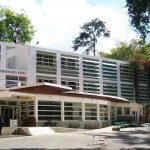Lien vers Pubmed [PMID] – 36153019
Lien DOI – e06146310.1136/bmjopen-2022-061463
BMJ Open 2022 Sep; 12(9): e061463
Data regarding the acquisition of extended-spectrum beta-lactamase-producing Enterobacteriaceae (ESBL-PE) in neonates at the community level are scarce in low-income and middle-income countries (LMICs), where the burden of neonatal sepsis is high.Our study aims at identifying and quantifying the role of the different routes of ESBL-PE transmission for neonates, which are still undefined in the community in LMICs.In a semirural community in Madagascar, 60 mothers and their neonates will be recruited at delivery, during which a maternal stool sample and meconium of the newborn will be collected. Home visits will be planned the day of the delivery and next at days 3, 7, 14, 21 and 28. Stool samples from the newborn, the mother and every other household member will be collected at each visit, as well as samples from the environment in contact with the newborn (food, surfaces and objects). Sociodemographic data and factors which might drive ESBL-PE acquisition will also be collected.We will analyse the isolated ESBL-PE using DNA sequencing methods to characterise clones, resistance genes and plasmids of ESBL-PE. To analyse these data globally, we will develop novel analytical approaches combining mathematical modelling and statistics. Finally, mathematical simulations will be performed to test different strategies of control of ESBL-PE transmission to neonates.In complement, we will conduct an anthropological investigation to understand local environments and practices that would contribute to neonatal ESBL-PE acquisition. In-depth interviews with members of 16 households will be conducted and 4 mother-newborn pairs will be followed by a participants’ observations methodology.The study was approved by the ethical committee in Madagascar and by the institutional review board of Institut Pasteur, Paris, France.Findings will be reported to participating families, collaborators and local government; presented at national and international conferences and disseminated by peer-review publications.







